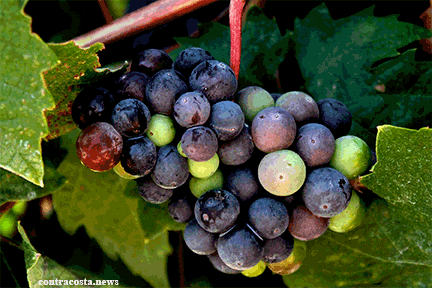Oakley takes action to allow more tasting rooms and wineries

29
On Tuesday, the Oakley City Council took steps that could allow more wineries and tasting rooms to open within city limits.
The City Council discussed changes to the wording of its rezoning ordinance to allow smaller properties to potentially apply for proper approval to open a winery – currently, only properties in the R-20 and R-40 districts are allowed, as they are 20,000 and 40,000 square feet, respectively. However, Oakley’s municipal code does not allow wineries, tasting rooms and agricultural processing in single-family residential districts with a minimum lot size of less than 20,000 square feet.
According to the staff report, the primary purpose of the zoning changes was to encourage further economic development within the city.
With Tuesday’s action, this will give properties with at least 20,000 square meters and an existing vineyard the opportunity to obtain a conditional use permit for a commercial Winery, tasting room or other processing of their wine products, This will help keep winegrowers in business by providing new paths to financial stability and opportunities for more small businesses in the Town of Oakley.
Ken StreloDirector of Community Development, explained that the ordinance was proposed to appeal to those who already have a vineyard at the time of applying for the conditional building permit.
Council member Shannon Shaw stated that she supported the section on wine-related uses and called it “great” that smaller properties would be given the same opportunities as larger properties.
Fuller wanted this point to be revisited in the form of separate ordinances covering wineries as one ordinance, agricultural products as another, and car washes as another.
Council member Aaron Wiesen supported the regulation in its current form.
mayor Anissa Williams suggested that agricultural products were included in the ordinance because wine is a product of a vineyard – the city attorney again explained that a vineyard must already be in place at the time of application, so someone cannot start producing agricultural products right away. Williams also added that this was intended for vineyards, not orchards.
Meadows said over the years many people have wanted to protect the vineyards and agriculture in the area and this is one way to do that – at least for a while.
“I know we’ve all heard over the years that we want to protect the vineyards, and my point is that they’re just sitting there until a developer comes along and redevelops them, but if we allow wineries to redevelop some of those parcels, those parcels will be protected, at least for a while,” Meadows said. “It helps the vineyard owners. It allows them to continue to grow. Right now, the state of the wine industry is a disaster.”
Meadows said he is in the industry and that the winery that has been buying from him for the past three years has cut back on sales and is no longer buying grapes in Contra Costa County.
“There is a massive oversupply of grapes and bulk wine. If we can help protect the vineyards we have, maybe they’ll stick around a little longer,” Meadows shared.
Williams agreed, noting that the saying goes: If you want to make a million dollars in wine, you better have two million dollars to start with, because it’s a losing business.
“I want us to stay as true to our agricultural roots as possible,” Williams said.
Shaw moved to approve zoning changes that would remove car washes from the ordinance, a request seconded by Williams.
Fuller asked clarifying questions, which Cole explained, but said he would abstain on the grounds that it was “too confusing.”
Passed by a vote of 4-0-1, with Fuller abstaining.
Car wash: By deleting this point from the regulation, it will be reinstated at a later date.
Fuller falsely claims cannabis is part of the wine regulation

During the session George Fuller said he saw cannabis and should have printed it out or taken a screenshot of it, which suggested that the agendas had been switched and a classified staff report was circulating somewhere.
mayor Anissa Williams I asked for the agenda and found that cannabis was not mentioned in either agenda. I wanted to confirm with staff that there was no “secret staff report” that no one had seen that mentioned cannabis.
“It says wineries and car washes, but was there a secret employee report that somehow accidentally got leaked?” Williams asked.
Strelo responded: “I can say that there was no draft that ever mentioned cannabis. We have no classified staff reports or anything like that. No drafts, no administrative versions. In fact, growing cannabis outdoors is frankly illegal. You can have up to 6 plants indoors that are fully enclosed.”
Council member Shannon Shaw confirmed that the amendment to the regulation only allows smaller properties to operate a winery and does not provide for any changes to the cannabis regulations.
Strelo confirmed Shaw’s statement.
“I’m in favor of it,” Shaw said, noting that the same regulation applies to larger properties.
City Manager Josh McMurray The reason given for submitting the winegrowing ordinance was that at least one landowner was interested and more could join in the near future.
Here is the video:
CEQA question
Fuller made some comments suggesting that the staff report somehow circumvented CEQA. However, the city attorney and staff corrected him, pointing out that the ordinance would have to be changed first and someone would have to apply for a permit before they could take any action on CEQA.
City Attorney Derek Cole announced that they would present a special CEQA finding on the agenda.
“When we have a land use matter before the Planning Commission or you, I work with the City Clerk to make sure that we specifically mention on the agenda the CEQA decision that we want the council to make on that matter on land use, CUP, rezoning or anything that involves zoning interpretation,” Cole explained, noting that they do this specifically because of court cases and that the Brown Act requires it. He said the city specifically mentioned the CEQA item on the agenda.


Vineyard on Virginia oak in Oakley during the winter months
Oenology: Vineyards turn brown in the winter months
Staying on the topic of cannabis, Fuller asked employees about their definition of a vineyard and why vineyards are brown and look dead.
Council member George Fuller questioned the ordinance’s definition of a vineyard, pointing to a classified staff report that included cannabis but was removed. He also wanted to know if Oakley considered brown vineyards dead and could replace them with another agricultural crop.
Strelo confirmed that this would be an agricultural grape production.
Council member Aaron Wiesen Fuller offered clarification since he owns vineyards.
“I want to clarify that I see two things in the ordinance. I see wineries and I see car washes,” Meadows explained. “One more clarification on vineyards: you don’t have to irrigate a vineyard to have a vineyard. I have an unirrigated vineyard, there are many unirrigated vineyards in Oakley. They are the old vineyards. My vineyards are brown in the winter because they don’t have any leaves. But in the spring they turn green. Just because you see a vineyard that is brown doesn’t mean it’s dead.”
Employee report: Click here
See also:



